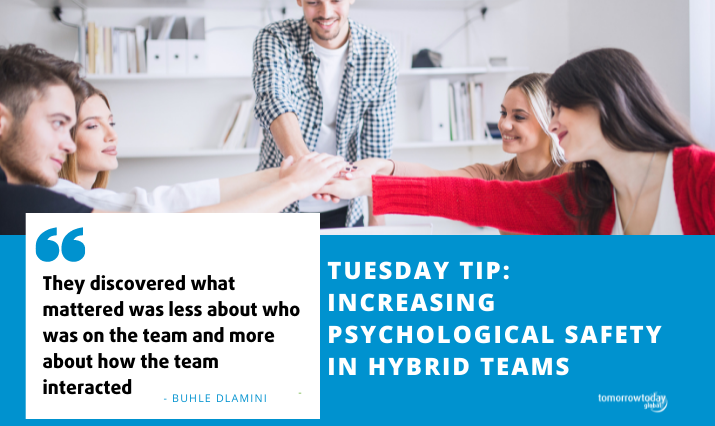Hybrid Teams are the future, but the big question is: As a Team Leader are you ready for what this shift in the way we work means for you and your team? We have been engaging with leaders from organizations all over the world on the topic of Healthy Hybrid Teams and they are all grappling with keeping teams motivated, productive and innovating in the new world of work.
What we know is that for teams to remain inspired, committed, and productive in their work they need to have a deep sense of belonging. Therefore, Belonging is our first ingredient for building Healthy Hybrid Teams in our model for success. Belonging speaks to the level of comfort, connection, and contribution that members have with the broader team. To achieve this, team members need to have psychological safety.
“After a 2-year study, Google discovered that five dimensions made teams successful: dependability, structure and clarity, meaning, impact, and the main one resulted in being Psychological safety. That is, they needed to feel that they were safe to take risks, ask questions or express their ideas without feeling embarrassed or rejected by their team members. They discovered what mattered was less about who was on the team and more about how the team interacted.”
Achieving psychological safety sounds much easier on paper than it does in real life, it is also a little easier to achieve in teams that are in the same physical space than it is for those working in a hybrid environment. How can you increase psychological safety when your team is not in the same space where they can regularly share in some laughter, make, and learn from their mistakes together and many other things that help build camaraderie?
Here are some tips and recommendations to consider for increasing psychological safety for your hybrid team:
1. One-On-One Meetings: No matter how many team meetings you have in a virtual space, the need for one-on-one sessions with your team members can never be overestimated. In Hybrid teams it can be easy for people to feel like they are just a number or just a face on the screen. Having regular check ins will ensure that your team feel and know that their contribution counts and that they matter, personally. Try to connect at least once a week and not only about work but also find out how they are doing and feeling.
2. Fun Time Gatherings: Organise virtual and in person fun connection meetings regularly. Now that things are opening up in some cities, you can organise connection gatherings to have a meal together with your team once every few weeks and make it something to look forward to. Make it fun, relaxed and with no big business agenda but to connect. You can also organise virtual fun meetings, you need to have more of a plan for the online ones, otherwise they can be lame. You need to have prepared games/icebreakers, making things together or cooking together (whatever you choose to do put some effort into it).
3. Manage Virtual/Hybrid Meetings Better: The last tip is about making sure that your virtual meetings and team interactions keep everyone included as much as possible. It is easier to create an “Us” and “Them” scenario when some people are in the room and others are dialing in. To avoid this, create an equal platform by making sure that expectations on how to engage in Hybrid meetings are clear for all. You can also utilise online tools like aha slides for everyone to share their responses or ideas making sure that everything gets captured. Make sure that everyone is always visible and can also be heard by everyone in Hybrid meetings. This is going to require that attention be paid to meeting room setup and our conference rooms, and yes it is urgent and important.
These are just some of the tips we can already implement to help increase belonging and psychological safety for our Hybrid Teams, but to achieve this will require more than just gimmicks and tricks, it requires true commitment to your team. You have heard it said many times, people don’t leave companies they leave managers/leaders. If you are committed to the success and wellbeing of your team members it will have a huge impact on how they feel at work, which impacts their productivity and innovation.
What if we told you there was a solution to unengaged, tired and unmotivated teams?
That managing and growing healthy hybrid teams isn’t as daunting as it sounds if you have a starting point, a framework, and a community to support you through the transition.


